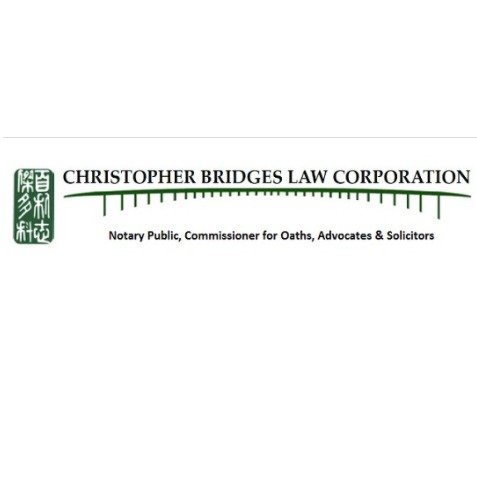Best Funds & Asset Management Lawyers in Singapore
Share your needs with us, get contacted by law firms.
Free. Takes 2 min.
Or refine your search by selecting a city:
List of the best lawyers in Singapore
About Funds & Asset Management Law in Singapore
Funds and asset management is a rapidly growing sector in Singapore, supported by a robust legal and regulatory framework. Singapore is recognized as a leading global hub for investment funds, wealth management, and alternative investments. The city-state's strategic location, political stability, and sound legal system make it an attractive destination for fund managers, investors, and financial institutions around the world. Legal standards in Singapore oversee the establishment, regulation, and management of all kinds of investment vehicles, ensuring investor protection and market integrity.
Why You May Need a Lawyer
Legal advice is essential in the funds and asset management sector, given its complexity and regulatory requirements. You may need a lawyer if you are:
- Setting up an investment fund or collective investment scheme in Singapore
- Navigating licensing and registration requirements with the Monetary Authority of Singapore (MAS)
- Structuring complex investment products or alternative investment vehicles
- Complying with ongoing regulatory duties, including anti-money laundering and countering the financing of terrorism (AML/CFT)
- Drafting or reviewing fund documentation, agreements, and offering documents
- Handling disputes between investors, fund managers, or custodians
- Restructuring or winding up funds or asset management entities
- Participating as a foreign fund manager looking to enter the Singapore market
- Responding to regulatory investigations, audits, or enforcement actions
A lawyer can guide you through these processes and help you avoid costly mistakes or penalties.
Local Laws Overview
Singapore's funds and asset management sector is mainly regulated by the Securities and Futures Act (SFA) and its subsidiary legislation. The Monetary Authority of Singapore (MAS) is the primary regulator overseeing licensing, conduct, and compliance matters for fund managers and investment advisors. Key aspects of local laws and regulations include:
- Licensing Regimes: Fund managers, real estate investment trusts (REITs), and other market participants may need to apply for licensing under the SFA, or be registered as Registered Fund Management Companies (RFMCs) or Licensed Fund Management Companies (LFMCs).
- Collective Investment Schemes (CIS): Rules govern the formation, operation, and marketing of both public and private investment funds in Singapore.
- Code on Collective Investment Schemes: Sets requirements for prospectuses, disclosures, and risk management for collective investment schemes offered to the public.
- Ongoing Compliance: Fund managers are subject to continuous obligations, including capital adequacy, risk management, compliance frameworks, and reporting duties.
- AML/CFT Requirements: Strict anti-money laundering and anti-terrorism financing laws apply, with mandatory client due diligence and reporting obligations.
- Taxation: Fund management activities are subject to specific tax incentives and regimes, such as the Enhanced Tier Fund Scheme and the Singapore Resident Fund Scheme.
- Investor Protection: Laws prioritize the protection of investors, with disclosure, transparency, and fair dealing mandated for all market participants.
Non-compliance with these rules can result in severe penalties, including fines, suspensions, or criminal prosecution.
Frequently Asked Questions
What types of funds are commonly set up in Singapore?
Common fund types include unit trusts, open-ended and closed-ended funds, hedge funds, private equity funds, real estate investment trusts (REITs), and variable capital companies (VCCs).
What licenses are required for fund managers in Singapore?
Fund managers must typically hold either a Capital Markets Services (CMS) license or be registered as a Registered Fund Management Company (RFMC) with MAS, depending on the size and activities of the business.
Who regulates the funds and asset management sector in Singapore?
The Monetary Authority of Singapore (MAS) is the main regulatory body governing this sector.
What is a Variable Capital Company (VCC) and why is it significant?
A Variable Capital Company (VCC) is a flexible corporate structure for funds that allows greater operational efficiency, flexibility in share issuance, and ease of fund consolidation, making Singapore more attractive for fund domiciliation.
Are there tax incentives for funds set up in Singapore?
Yes, Singapore offers various tax incentive schemes, such as the Enhanced Tier Fund Scheme and the Singapore Resident Fund Scheme, which provide tax exemptions for qualifying funds.
What are the disclosure requirements for public funds?
Public funds must comply with detailed disclosure requirements set out in the Code on Collective Investment Schemes, including prospectus registration, risk warnings, and regular reporting to investors and MAS.
What ongoing compliance requirements do fund managers face?
Fund managers must comply with regulations on AML/CFT, risk management, client due diligence, regular reporting, and maintaining adequate financial and operational resources.
Can foreign fund managers operate in Singapore?
Yes, foreign fund managers can operate in Singapore, but they must comply with local licensing requirements and may need to establish a presence in Singapore to offer their services to local investors.
How are disputes involving funds typically resolved?
Disputes can be resolved through negotiation, mediation, arbitration, or litigation, depending on the nature of the dispute and the agreements governing the fund or investment product.
What happens if a fund manager breaches regulatory requirements?
Regulatory breaches may result in administrative sanctions, monetary penalties, suspension or revocation of licenses, and in severe cases, criminal prosecution by MAS.
Additional Resources
If you need further information or support in the funds and asset management sector, these resources may be helpful:
- Monetary Authority of Singapore (MAS) - The main regulator for funds and asset management in Singapore
- Singapore Academy of Law (SAL) - Provides legal resources and directories for finding experienced lawyers
- Law Society of Singapore - Offers a “Find a Lawyer” service and general guidance on engaging legal professionals
- Singapore Funds Industry Group (SFIC) - An industry body providing insights, guidelines, and events relevant to fund professionals
- Inland Revenue Authority of Singapore (IRAS) - Information on tax incentives and schemes available for funds
- Ministry of Law - Guidance on business regulations and dispute resolution options
Next Steps
If you believe you need legal assistance in funds and asset management matters, consider taking the following steps:
- Outline your objectives and gather relevant documents, such as business plans, fund structures, and any correspondence with regulatory bodies
- Contact a law firm or practitioner experienced in funds and asset management for an initial consultation
- Ask about the lawyer’s specific experience in dealing with fund setups, compliance, and disputes relevant to your needs
- Discuss potential costs, timelines, and required documentation upfront
- Follow your lawyer’s advice on compliance, structuring, and regulatory submissions to ensure smooth and timely outcomes
- Stay updated on regulatory changes by subscribing to updates from MAS or professional bodies
With the right legal support and a clear understanding of regulatory requirements, you can confidently participate in Singapore’s dynamic funds and asset management sector.
Lawzana helps you find the best lawyers and law firms in Singapore through a curated and pre-screened list of qualified legal professionals. Our platform offers rankings and detailed profiles of attorneys and law firms, allowing you to compare based on practice areas, including Funds & Asset Management, experience, and client feedback.
Each profile includes a description of the firm's areas of practice, client reviews, team members and partners, year of establishment, spoken languages, office locations, contact information, social media presence, and any published articles or resources. Most firms on our platform speak English and are experienced in both local and international legal matters.
Get a quote from top-rated law firms in Singapore — quickly, securely, and without unnecessary hassle.
Disclaimer:
The information provided on this page is for general informational purposes only and does not constitute legal advice. While we strive to ensure the accuracy and relevance of the content, legal information may change over time, and interpretations of the law can vary. You should always consult with a qualified legal professional for advice specific to your situation.
We disclaim all liability for actions taken or not taken based on the content of this page. If you believe any information is incorrect or outdated, please contact us, and we will review and update it where appropriate.
Browse funds & asset management law firms by city in Singapore
Refine your search by selecting a city.















